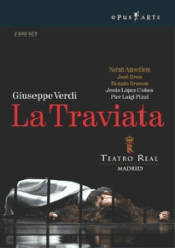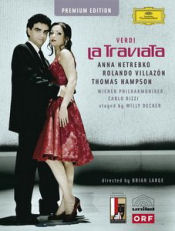Now come two more: the 2005 Salzburg staging (featuring Anna Netrebko, Rolando Villazon, and Thomas Hampson) and Madrid's version from the same year (with the less starry but able cast of Norah Ansellem, Jose Bros, and Renato Bruson).
The Salzburg Traviata prompted a barrage of publicity for its stark staging and the sheer appeal of its young stars. DG has already put out a solo disc for Netrebko simply called "Violetta," and not long after came the CD soundtrack to the production (reviewed earlier on this site by Jan Neckers). Now at last the whole production can be seen, in a two-disc DVD set, one containing the opera and the other packed with "bonus" features (DG calls this a "special additional" DVD, since the retail price reflects the cost of the second disc).
When the glare and fuss of publicity has died away, what remains to be seen is a Traviata of bracing theatrical energy, sung with passion and charisma (if not always ideal technique). Willy Decker's design and direction may conform to some negative stereotypes of modern stage production, with its bare stage, its few props (dominated by a huge clock), and its performers in modern dress. But an opera as frequently performed as Traviata benefits greatly from a thorough scrubbing away of layers of time-honored varnish.
That clock received some derision for being too obvious a symbol of Violetta's fate. Yet in the typical Traviata, aside from Violetta issuing a weak cough or two in act one and a line in the second act confrontation with Germont, this dark shadow rarely gets cast until the last act. Viewers should consider that librettist Piave initially recommended the opera be titled "Love and Death" (Amore e morte). Decker also has Doctor Grenville haunt the proceedings from the opening prelude. In essence, Decker presents a Traviata of multiple time planes, where past, present and future intermingle. Another example is the opening of act two, which typically has our Alfredo standing mid-stage alone, singing of his passion for Violetta. In Salzburg, Violetta joins him in playful love games on sofas draped in flowery prints, so that we live their affair as Alfredo sings about it. Literalists will not approve; everyone else can revel in the immediacy of the drama.
Villazon's ardent Alfredo, occasionally edgy with anger, finds his dark timbre emphasizing the manliness of Alfredo. And it would take a very masculine man to capture the full attention of Netrebko's lusty tigress of a Violetta. She eschews self-pity and goes for a desperation to cling to life of sensual ferocity. Not every note these two sing can be compared with that of the finest performers of these roles in the opera's long history; neither singer, however, has been excelled in vivacity of characterization and dedication to a director's vision. And yes, it helps enormously that both look and move as we would expect these young lovers to do (that is, in the context of Decker's staging).
However, neither Decker nor Thomas Hampson can find much to do with papa Germont. So much of this Traviata flows with such choreographed, and yet natural, precision, yet "Di provenza il mar" defeats Decker, as Villazon must stumble around the stage shaking his head and grimacing for minutes on end while his father pleads with him. Not helping matters is Hampson's one-dimensional approach (Germont as stiff prig) and some surprisingly rough tone as well.
Carlo Rizzi's insistent tempos match the drive of this production, but as the last acts run together, any brief lyric respite comes as great relief. The Salzburg audience goes nuts at the end, and cameras in the wings capture an ecstatic Netrebko high-fiving Villazon before taking final bows. This Traviata makes a place for itself as an essential version of Verdi's masterpiece, despite the growing competition on DVD shelves.
 The Madrid production, filmed just a few months earlier, has much to recommend it as well. It received its own publicity when Angela Gheorghiu walked out after the first rehearsals, claiming that director Pier Luigi Pizzi's approach was in scandalous bad taste. Up-and-coming soprano Norah Ansellem replaced the temperamental star, and to some extent she accomplished a "star is born" effect. Her Violetta is sadder, more preyed upon by than in control of the men in her life. She may live in glamorous surroundings amidst seedy goings-on, but she clings to her dignity. In fact she is dressed modestly throughout (what on earth was Gheorghiu going on about? Flashes of bare-breasted females at Violetta's party and then Flora's? Bizarre).
The Madrid production, filmed just a few months earlier, has much to recommend it as well. It received its own publicity when Angela Gheorghiu walked out after the first rehearsals, claiming that director Pier Luigi Pizzi's approach was in scandalous bad taste. Up-and-coming soprano Norah Ansellem replaced the temperamental star, and to some extent she accomplished a "star is born" effect. Her Violetta is sadder, more preyed upon by than in control of the men in her life. She may live in glamorous surroundings amidst seedy goings-on, but she clings to her dignity. In fact she is dressed modestly throughout (what on earth was Gheorghiu going on about? Flashes of bare-breasted females at Violetta's party and then Flora's? Bizarre).
Vocally, Ansellem offers much but has a ways to go. Conductor Jesus Lopez Cobos keeps textures muted to allow for some softer singing, and here Ansellem is at her best, producing some very fine readings. When volume is called for, the voice sounds prematurely aged, with a worrying incipient vibrato. Understandably mature-sounding, veteran Renato Bruson lets the nature of his voice at this stage of his career work to add a softer, more vulnerable side to his Papa Germont, much appreciated in comparison to Hampson in Salzburg. And Jose Bros, a fine bel canto singer, brings out that gentle side to his Alfredo. A man with a handsome face, Bros's short, thick physique may make him a somewhat unlikely source of physical attraction for Violetta, but that sweet voice can compensate a lot.
Pizzi's updating to the 1940s is apparently more for style than anything else - Ansellem takes several puffs on cigarettes from time to time in classic mid-century movie star posture. The highlight here is the physical beauty of the sets, especially the bifurcated areas of act one and the first scene of act two. Having two rooms on stage allows certain comings and goings in the story to occur more naturalistically, and the detail impresses, from the bathroom at the rear of Violetta's bedroom to the birch trees outside the country home. However, DVD viewers may wonder how the set worked in the house, where the wall down the center of the sets (though not down to the footlights) might have blocked some views for those seated at the far sides.
Pizzi also has some clever direction in act two scene two, where for once Violetta makes a creditable attempt to speak to Alfredo before being called to dinner, and then everyone disappears behind panels backstage. This gives the Alfredo/Violetta confrontation a more intimate feel, and also eliminates the silliness of some productions where all the party-goers rush in from off-stage on cue. Here the panels open and the guests pour out in fairly realistic fashion.
On the debit side, Pizzi has Alfredo open act two singing of his great love for Violetta, while casually pouring himself a cup of morning coffee and glancing at the newspaper. The action contradicts the message. Likewise, Violetta's final collapse doesn't have the punch it should have, as she runs away from those who love her to die alone on the balcony (which has mysteriously appeared where her parlor was in act one).
A few times the orchestra sounds regrettably tentative, and many may find the pauses and emphatic timpani thwacks with which Lopez-Cobos underlines Violett's cries of "Amami Alfredo" too mannered.
The bonus feature interviews stick to a dull "talking head" format, with only Ansellem finding much of interest to say - ironically, focusing on the shadow of death aspect so important to the Salzburg production. A fascinating documentary on the DG set takes us through the rehearsals with the endlessly appealing Villazon and Netrebko. We also see some uncomfortable moments between Hampson and director Decker. All in all, a model bonus feature.
So the Madrid DVD deserves much praise, and for those with an undiminished appetite for this work, it merits viewing. But for those wary of "another" Traviata, the Salzburg DVD stakes out a rare position as a "must-have." Along with the recent Glyndebourne Giulio Cesare, this will surely rank as one of very best releases of 2006.
Chris Mullins

